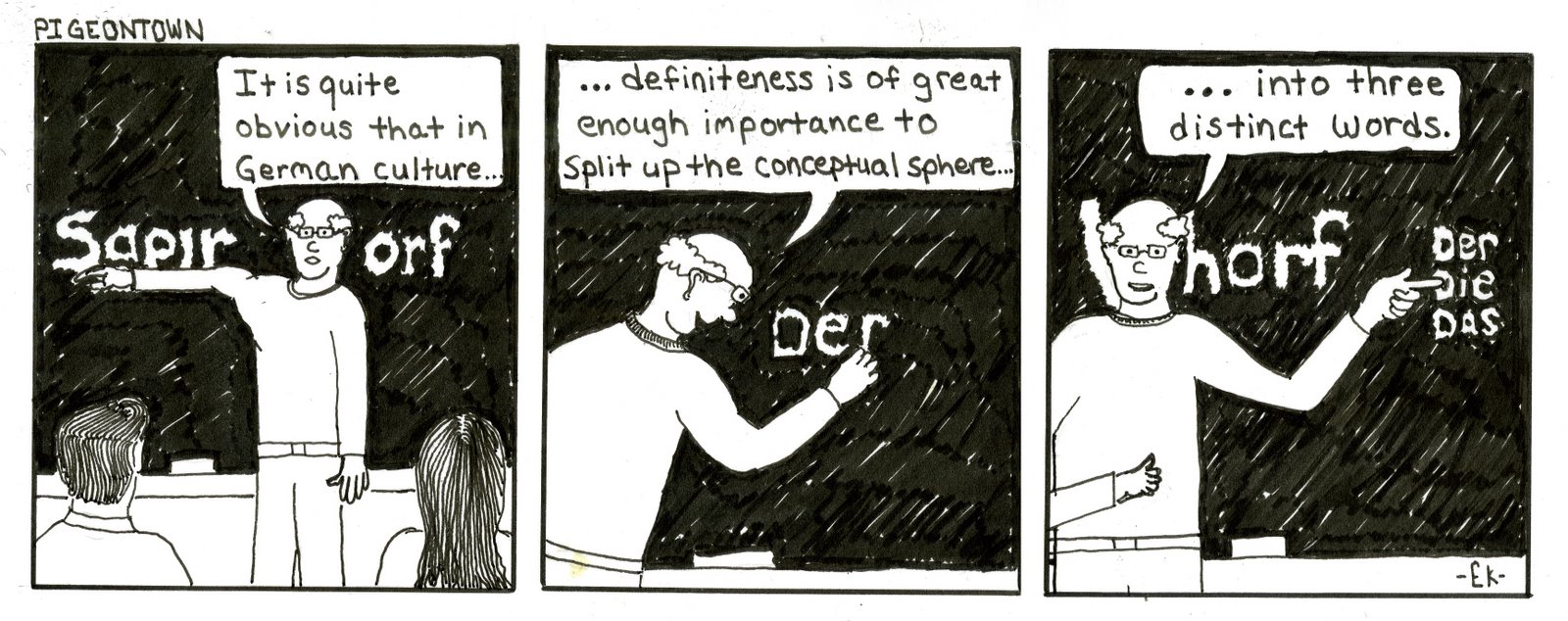Pigeontown
« previous post | next post »
A couple of days ago, I drove up to Los Angeles from my Language Log Plaza basement office in San Diego, for a quick visit with my grad school classmate Ed Keer. Ed lives in Philly (where Mark Liberman's swank executive suite is located), and was in LA on business. I've visited Ed a few times back East since I moved to California, but this is the first time he's come out here — he says his excuse is that he's got a "real" job and "kids" — so I felt it was worth the 5-6 hours of total driving time to have dinner with Ed (and two of his co-workers, as it turned out) and drive him to the airport to catch his red-eye flight back East.
Ed ended up missing his flight, which is why I thought he had announced to the (twittering) world that I am dead to him, but it turns out that he's just upset with me for not posting the latest in his comic series, Pigeontown. "Arnold posts Zippy and Mark posts Zits; why don't you post Pigeontown already?", Ed said to me, apparently while his plane was leaving the gate at LAX. So, in part to get myself back in Ed's good graces (maybe) but also because it happens to have actual linguistics content (about which see below the fold), here's the latest Pigeontown (click image to enlarge):
The reference in this comic is to the Sapir-Whorf hypothesis, discussed many times here on Language Log (just search for "whorf" and you'll find plenty of posts, both here and on LL Classic), which is often the point of discussion when the old Eskimo-words-for-snow canard is brought up. When Geoff Pullum wrote "The Great Eskimo Vocabulary Hoax" in 1989, he quoted the following passage from a linguistics textbook:
It is quite obvious that in the culture of the Eskimos … snow is of great enough importance to split up the conceptual sphere that corresponds to one word and one thought in English into several distinct classes…
To demonstrate how ridiculous this claim is, Geoff wrote the following variation:
It is quite obvious that in the culture of printers … fonts are of great enough importance to split up the conceptual sphere that corresponds to one word and one thought among non-printers into several distinct classes…
Ed's comic is, of course, another variation on this quotation.
Are you happy now, Ed?

Faldone said,
December 21, 2008 @ 8:04 am
Since I've been aware of the mother of all snowclones I've had attached to it the further comment that the Eskimos had no word for snow. That is, they had no single word for all the things that we lump together as snow. I had thought that this concept was there from the git go but what little research I've managed to do (I'm just this guy, so I don't have access to all the classics of Western Literature) has suggested that it was added by Sapir in his pre-linguist days.
A) Is there any truth to the notion that any of the Inuit/Yup'ik don't have an all encompassing lexeme for 'show'?
2) Where did this notion come from, i.e., who first articulated it?
Craig Daniel said,
December 21, 2008 @ 10:15 am
The craziest version I've ever heard is that "The Eskimos have {$BIGNUM} words for snow, but no word for love." I have no idea what's up with that one.
Eric Baković said,
December 21, 2008 @ 1:27 pm
Faldone: the answer to your question might be found by searching for "eskimo snow" on LL Classic.
Faldone said,
December 22, 2008 @ 7:22 am
@Eric: Some good stuff in there but I haven't found an answer to my basic question. Let me rephrase it with some of the knowledge I've gained. What I'm trying to find out is the origin of the contention, apparently lost from the popular understanding of the "n words for snow" meme, that Eskimoan languages have no one root that would encompass both qani- and api-.
Ed said,
December 22, 2008 @ 8:53 am
I'm happy now. Why are you censoring me? And why isn't anyone concerned that the Germans have THREE words for 'the'? That sounds like a dangerous combination.
Craig said,
December 23, 2008 @ 5:53 pm
@Ed
I think you're really onto something here. More evidence for your theoretical work in progress: the Ancient Greeks had 16 words for 'the', but the Romans had none. Therefore, the Greeks must have been obsessed with definiteness and specificity, while the Romans had an "anything goes" attitude about it, which obviously led to their downfall.
Nobel Prize in Linguistics, please.
Bill Walderman said,
December 24, 2008 @ 1:49 pm
@ Craig
"the Ancient Greeks had 16 words for 'the',"
I count 21. Are you counting four dual forms? But even without the dual, there should be 17, shouldn't there? And doesn't 21 as opposed to 16 also tell us something significant about the ancient Greek mind? And what happened to the minds of speakers of the dialects that lost the dual altogether?
And where does that leave the Russians (and other Slavic-speakers)?
Faldone said,
December 24, 2008 @ 5:49 pm
English used to have 25. Now we have one. So what does that say about us?!
Craig Russell said,
December 25, 2008 @ 12:20 pm
@Bill
I shouldn't have posted so rashly; I counted in my head, didn't think of the dual, and miscounted the ones I did count. Your counts are right–and thank god! We wouldn't want to underestimate the Greeks' emphasis on definiteness.